This is what differentiates between “hardworking” and professional chefs, people who have a deep understanding of ingredients and scientific cooking techniques.
The dish will always have a perfect structure, color, and flavor instead of being good or bad depending on inspiration and instinct.
Learn the tips to fry eggs like a professional chef to upgrade your cooking skills and turn this familiar dish into a deluxe restaurant version, plump and fluffy!
1. Don’t use chopsticks or spoons to beat the egg
Egg whites contain mostly protein and water.
Egg yolks contain mostly lipids (fats), a small amount of protein, and carbohydrates.
Therefore, egg yolks need a higher frying temperature than egg whites.
Beating eggs helps break the structure of the yolk to dissolve into the egg white, creating a uniform egg mixture. The uniformity ensures that the entire surface of the egg when fried does not have any dry or mushy areas.
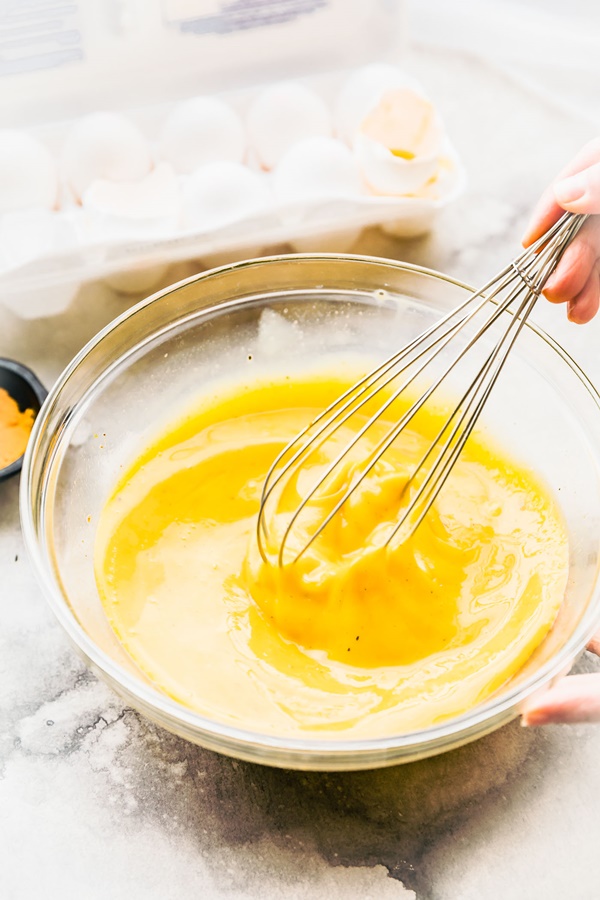
Beating eggs with a spoon or chopsticks will make it difficult for the egg mixture to become completely uniform. The quick, effortless way to help the egg’s structure after frying is plump and soft is to use a handheld egg beater.
2. What spices should be added to the egg mixture?
We often tend to add many spices to the egg to create a rich flavor after frying, such as fish sauce, MSG, sugar, salt, and pepper.
Salt is recognized as a spice that should be added to the egg mixture before frying. Because salt helps dissolve the protein molecules in the eggs, making the fried egg structure have many air holes, and the eggs will be very porous, soft, and fluffy.
Professional chefs will usually add a little salt, pepper, and coriander to the egg mixture. Many spices will overwhelm the main fat aroma of the eggs.
It is unnecessary to add water to the egg mixture. Instead of water, use fresh milk; milk helps increase the fat, aroma, and makes the eggs fluffier.
3. Fried eggs are bland. Adding meat, sausage, or mushrooms requires attention
Ingredients such as mushrooms, meat, sausage, bacon, etc., should be cooked separately.
Do not fry them with the eggs because these ingredients have high moisture content and will affect the frying temperature of the egg mixture.
If fried together, the eggs will cook first while the other ingredients are still uncooked. The eggs after frying will be too soft due to waterlogging, even broken and collapsed.
If fried for a long time so that all are cooked, the eggs will be dry and hard. The right time to add these ingredients is when the eggs are cooked and the stove has just been turned off.
Put the filling you like in the middle of the egg and roll it up.
4. Suitable time and temperature to fry eggs
You can fry eggs over low heat for an extended period.
Or fry over high heat for only about 1 – 2 minutes.
Time, temperature, and frying technique are essential factors determining the structure of the eggs.

Tip: Set the heat to medium or high. As soon as the eggs are poured into the pan, use a spatula or spoon to stir the eggs in a circular motion until the eggs are almost cooked (about 85% cooked), then stop stirring, and spread the eggs evenly to shape.

The golden fried eggs, fragrant and fatty. When you bite into it, it melts in your mouth, so who wouldn’t like it, right everyone?
According to Young Intellectuals
Revealing the Secrets of Delicious Cooking by a Professional Chef
Are you looking to become the master chef of your home kitchen? Ði?n máy XANH is here to help with their tips on how to serve up restaurant-level dishes, from proper cooking methods for meat and grilling, to baking delicious cakes. So pick up your apron and get ready to show off your culinary prowess!
Don’t add fish sauce when frying eggs: Add a little spoonful to these golden, soft eggs and they’ll be as fluffy as a sponge cake.
 fluffy as a sponge cake.’>
fluffy as a sponge cake.’>With just a few simple tricks, you can create perfectly smooth and beautifully golden soft-boiled eggs that are as delicious as a sponge cake.



































